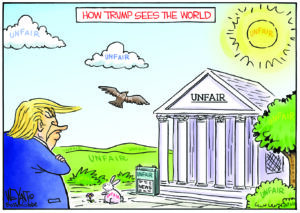A Surge Against the Surge
Before you accept the canard that a congressional anti-surge resolution would be meaningless, consider how hard Bush & Co. is working to prevent a vote on it.WASHINGTON — When political opponents tell you that to prove your seriousness you need to pursue a strategy they know is doomed to failure, shouldn’t you be skeptical of their advice?
As the Senate considers a resolution to put itself on record opposing President Bush’s escalation of the Iraq War through a “surge” of troops, Bush’s backers are saying one thing and doing another.
They are saying that the resolution is meaningless and that true opponents of the war should prove their sincerity by cutting off funding altogether. But they are doing all they can to keep the Senate from even voting on a bipartisan anti-surge resolution that would send a powerful message to Bush that most Americans have lost faith in his bungled war policy.
If you doubt that the war’s supporters would love its opponents to put all their eggs in the fund cutoff basket, consider what it means for them to sound as if the administration’s only serious foes were the likes of Dennis Kucinich and Cindy Sheehan.
“I don’t think these resolutions, nonbinding resolutions, are going to accomplish anything,” Sen. John Cornyn, a Texas Republican and a Bush loyalist, told Gwen Ifill on PBS’ “NewsHour” last week. “If we really had the courage of our convictions,” Cornyn said, the ‘we’ referring to the war’s opponents, “if people said, ‘You know what? This is an immoral task we’ve asked our troops to do because we don’t believe in the mission, we think they’re going to fail,’ they ought to cut off funds. But to have this sort of — this debate without any real consequence, I just don’t think is the best use of our time.”
So Cornyn wants to block a vote on a supposedly unimportant anti-surge resolution, but would be happy to entertain a debate on a fund cutoff. Does that not send a message to the war’s critics?
And it’s not just Cornyn. It is now a standard talking point for supporters of this war, from the editorial pages of The Wall Street Journal and The Weekly Standard to Vice President Cheney himself, to try to block any statement by Congress of its views, except through a vote to block funds for Iraq.
“The Congress has control over the purse strings,” said Cheney, who on most other occasions insists upon the executive’s supremacy over Congress. In an interview with CNN’s Wolf Blitzer last month, Cheney added: “They have the right, obviously, if they want to cut off funding, but in terms of this effort the president has made his decision. … We’ll continue to consult with the Congress. But the fact of the matter is, we need to get the job done.”
In other words: even if a substantial majority of Congress that includes many Republicans demonstrates a lack of confidence in the Bush-Cheney surge, the administration will feel free to ignore the other elected branch of our government — and the more recently elected branch (remember November’s elections, anyone?) at that.
Oh, and if an anti-surge resolution were trivial, why would William Kristol, The Weekly Standard’s editor and one of the war’s most passionate advocates, devote a long and angry editorial in the latest issue of his magazine to attacking Sen. John Warner, R-Va., and other Republicans as “ignominious” for their support of an anti-surge measure? Kristol knows that every Republican vote against escalation carries special weight in speeding this war to an end. So does the Senate’s Republican leadership, which used a procedural vote Monday evening to impede the majority’s will on the surge.
Supporters of Bush’s war policy would love a vote on a full funding cutoff right now because they know that, at this moment, they could win it. They would love responsibility for the failures in Iraq to fall not on an administration that planned its policy so badly and carried it out so incompetently. Far better for them to heap blame on the war’s opponents for “losing faith.”
And they know, as the war’s opponents should, that in a democracy whose Constitution accords so much power to the president, turning around even a failed war policy takes time, persuasion, organizing, legislative strategizing and pressure.
The impatience of the administration’s critics is entirely understandable. But it would be a shame if impatience got in the way of a sensible long-term strategy to bring America’s engagement in this war to as decent an end as quickly as possible — even if not as quickly as they’d like. The anti-surge resolution is a necessary first step. Which is why those who are against a genuine change in our Iraq policy are fighting so hard to stop it.
E.J. Dionne Jr.’s e-mail address is postchat(at symbol)aol.com.
Your support matters…Independent journalism is under threat and overshadowed by heavily funded mainstream media.
You can help level the playing field. Become a member.
Your tax-deductible contribution keeps us digging beneath the headlines to give you thought-provoking, investigative reporting and analysis that unearths what's really happening- without compromise.
Give today to support our courageous, independent journalists.






You need to be a supporter to comment.
There are currently no responses to this article.
Be the first to respond.